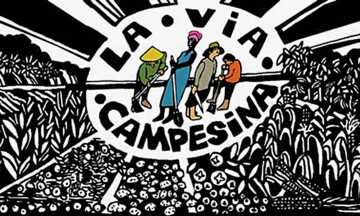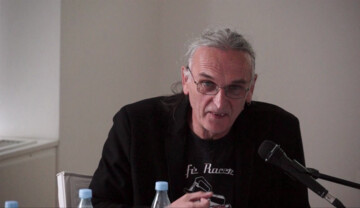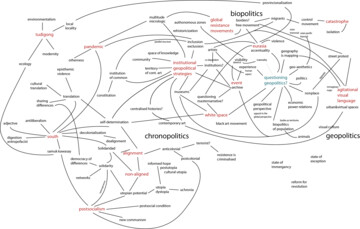Geo-politics crystallized itself as an clear idea in the times of imperialism at the break of 19th and 20th century. The colonial hegemony over the wast “un-ruled” and “non-Modernized” geographies has been the driving ideological and practical force behind the Western national states, which shaped the idea of geopolitics and it's practice of subordination of “outer” space and “inner” inter-national conflicts. “Internationality” is therefore a result of these historical hegemonic restructuring. The periphery and the “outer” space (Central European, for instance) comprehends this “inter-nationality” mainly as inter-ethnicity including the Romantic post-1848 revolutionary counter-hegemonism, which has been established upon the mythological construct of Volksgemeinshaft (people's community), and exists now as a raw nationalism. Hence there's no geopolitics without national hegemonism.
A century later we're witnessing the formation of globalized web of elusive hegemonic power, which consists of fast global fluxes of capital. The capital here has to be understood as the form of subordination and not just in strict economic sense. Because of the falling profit rate and the threat of the crisis, the capital flux embodies itself mainly as evasive flux of financialization. The role of the national state differs inasmuch, that we can talk about the end of nation-states and the constitution of some other type of sovereignty. It does not mean that this a-centric and uncatchable force is not internationally or informally institutionalized. Or that the national state already perished. It only changed it's nature. All these changes have been fostered and accompanied by the new ideological belief, we're calling now neoliberalism. Contrary to the common image, it is not an economic theory, which could adapt to the argumentative or empirical processes, it is moreover a kind of the new religious dogmata, which was adopted by the ruling elites.
It means, that the resistance and the processes of emancipation had (and have) to change their terrain and modes of action. They have to globalize, not in the sense of inter-nationality but in the sense of trans-nationality. But which are these new emancipatory subjectivities capable to confront the geopolitics of evasive capitalism? We can identify them, at least from the end of the nineties, in the new, as a rule grass root, social movements. Contrary from the beginning of the 20th century, these movements are not and should not be hierarchical and authoritarian or aiming to conquer the state apparatus to rule and change the society from above. They even do not need to be an organization. They are just multiplicity of initiatives and struggles. Initially, they emerge from life-world and have commonly anti-systemic connotation. Be it the identity policy (ethnic identity rights or LGBTQ issues, for instance) or class struggle, environmentalism or free movement of migrants and refugees, peace politics or sustainable economy etc., they all constitute an nonhierarchical conglomerate of the contemporary global resistance. We can grasp it through Adorno's micrological thought, which prevents dialectical reconciliation in the totality. In his negative dialectics, the reconciliation is “mediation on the no-longer-hostile multiplicity”. We can refer to the Negri's and Hardt's notion of multitude. We can be anarchists. We can go to Chiapas or Rojava to educate ourselves. There are even more possibilities to understand these heterogenous emancipatory multiplicity and limitless possibilities to actively join up.
After two decades of global resistance frequently the question pops up about it's impacts. Through the mainstream media, but also through the numerous defeats, it seems that the global neoliberal rule is invincible. Within the life world even the defeat should become an valuable experience. But the forms and pace of resistance is even faster than the rule of postmodern capital. We have established the networks on the internet, but also in the real life (IRL). For instance Via Campesina. From alter-globalization protests to the world and local social forums, from occupy movements to the anti-austerity movements – all these resistance consists of this vivid heterogeneous subjectivities, initiatives and topics. This is the life-experience, which counts and persists in spite of violent systemic pressure. The exodus prevails, in spite of death and suffering.
Still, there's an open question within movements of resistance. Do we need to constitute also an alternative or parallel structure? A structured counter-power? Non-hegemonic provisional hierarchy? Are non-formal networks immune to the informal hierarchies and egotisms? Is it possible to formulate a minimal common platform? How to neutralize the national state-oriented leftists, which were imposing themselves in social forums and anti-austerity movements? How to confront the hijacking of our actions and it's media? What's the role of self-defense? The limits of non/violence?
The micropolitics of global resistance not just confronts but also transcends the seemingly homogenous neoliberal block of contemporary geopolitics.
Keywords: alter-globalism, resistance, occupy movement, anti-austerity, OXI, neoliberalism
Reference: Darij Zadnikar, Adorno and Post-vanguardism, in: John Holloway, Fernando Matamoros and Sergio Tischler (eds.) Negativity and Revolution: Adorno and Political Activism, London: Pluto Press 2009.





